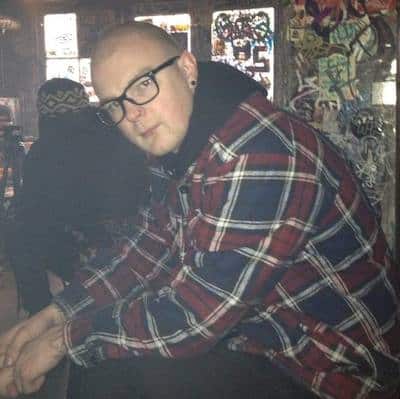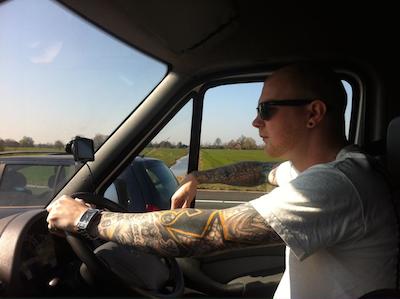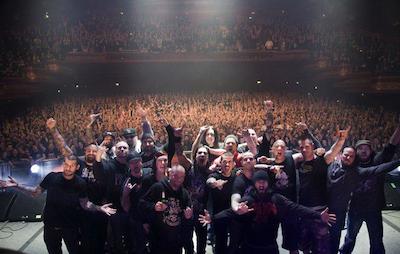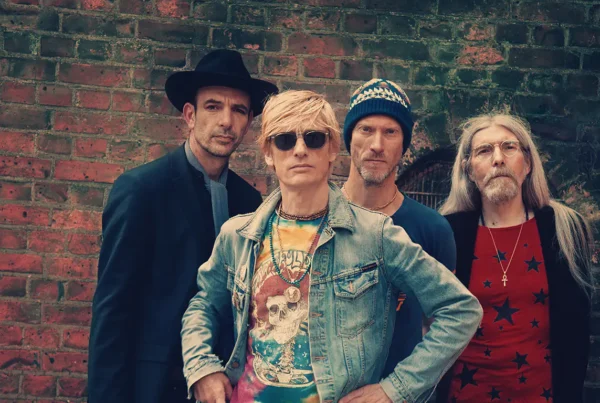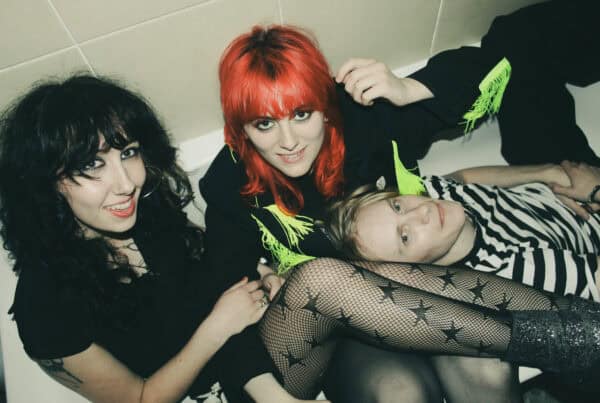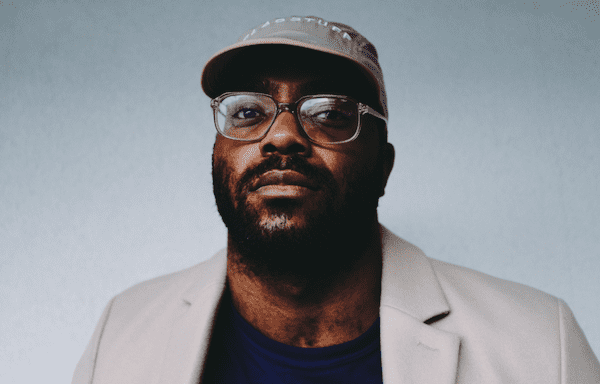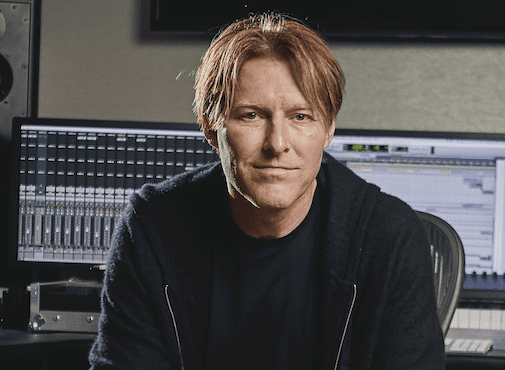Soundsphere magazine caught up with Simon Gallacher, the tour manager for letlive. and a man who has toured and work with some of the biggest names in rock. He is also a promoter, merchandise man and self-confessed entrepreneur. We asked him for the secrets to his success and his tips on how to make it as a tour manager or promoter’s rep in this hard-to-crack industry sector.
S] First question is an obvious one. Can you introduce yourself and tell us a little bit about what you do?
Simon] “I’m Simon Gallacher. I’m originally from Glasgow, Scotland. I now live in Leeds. I’ve worked as a tour manager for the last six years. Some of the acts I’ve tour manager for include Four Year Strong, Letlive., Pure Love, Miss May I. I’ve worked for various management companies along the way. I do merchandise. I handle merchandise for Immortal Technique. I sell merchandise for New Found Glory and Less Than Jake. Previous to tour managing I was a promoter for ten years. Recently, I’ve scaled down the amount of touring I want to do, I mainly tour with letlive. now and I predominantly work for Live Nation as a promotions rep.”
S] What are the biggest challenges you face on a daily basis? It sounds like a great career but what would you say the challenges are on a day-to-day basis?
Simon] “I guess the one of biggest challenges is prioritising things, and obviously the amount of e-mails that are received every day, it’s a matter of looking and prioritising and seeing what’s most important. Always thinking two steps ahead, if you miss an e-mail what’s going to be the backlash of it, what the consequences are. I’m very much a list man. I make lists and I tick them off as I go and I’ll categorise into e-mails for Live Nation, e-mails for touring, e-mails for Temples Festival that I’m working on. That’s a massive part of my day right now. I’d say workload is the main challenge. Obviously when I’m on tour it can be very very difficult. I don’t use an out-of-office reply as I try to reply to as much as I can but sometimes it will be an e-mail saying ‘I’ll get back to you tomorrow’. Sometimes, you need to sit down with a clear head to look at something.”
S] What gets you up in the morning? What keeps you passionate and motivated?
Simon] “I know this will sound so cliché, even at thirty years old, but it’s literally just the love of the job. I honestly can’t remember the last time that I’ve woken up and thought ‘Oooooh, I have to go to work today.’ And don’t get me wrong, everyone has good days and bad days. Sometimes when my inbox is full I think ‘Oh I’m so stressed!’ but at the end of the day I’m doing exactly what I love. There’s always something different going on. There’s always something good going on that overshadows any bad or anything that’s difficult. It’s constantly a clean slate.”
S] How important do you think personal relationships and personal connections are in this industry?
Simon] “I think it’s exceptionally important! I think in this day and age with the amount of people that uses being online as a form of communication, if I’m trying to pitch for a job I always pick up the phone to speak to someone. Speak in a nice, clear manner and I think if people can hear your tone of voice and your confidence across the phone. I think the phone is very much a lost art in this day and age. People hide behind e-mail, people can big themselves up in e-mail, and then when they pitch up they’ve bitten off more than they can chew. Because if you have a massive celebrity that you have to deal with then you need to have a bit of character; a bit of charisma, the correct confidence and the correct demeanour to deal with that person. Whereas you can e-mail them in a very sterile form and then you might get there and have the personality of a lettuce, which obviously you need to have a bit of back and forth and know your place. I think that very much comes across via telephone.”
S] What would you say, to someone who is new in the industry, are you key tips for being a successful tour manager?
Simon] “The main ones that spring to mind are honesty at all times whether it be good news, bad news or whatever. Always be straight down the line with people. If you’re into any funny business then you will get caught out. If you’ve spun a yarn then you need to remember what you’ve said and as soon as you’re tarred with that brush then there’s no going back. You’ll never work again. Always be aware that when you meet people, you never know who you’re talking to. You never know who people know. If you have an opinion always keep it to yourself. The final main one is that make sure you’re always everyone’s port of call and you have always got to be that guy that holds it together. For instance, I hate flying, I’m absolutely terrified of it. But when I do a fly-in show with a band I just keep it straight faced because I know, even if they’re nervous they’re looking to me and thinking ‘Well, he’s our tour manager. He’s my life-line.’ The famous saying I use is ‘It might be Saturday night kicking off in your head but it should be Sunday morning on your face.’ Make people feel like you are the guy to come to, to solve all the problems.”
S] What key tips have you got for any aspiring promoters?
Simon] “In terms of promoting, I would say know your market. If you’re into country and western, don’t try and promote a death metal show because agents will always tell you that their band are worth more than they are and if you don’t have a great knowledge in that field it can be very difficult to make the right choices. Know your market in terms of area, like know who your strong local bands are, know who your local up and coming bands are. Know who’s hot in your area and what genres are hot. Watch what other venues are doing and what kind of acts they’re booking. If football is a big thing in your area make sure you don’t book gigs on the same night as big matches. Always do your homework before you confirm a date with an agent. Try and keep a good relationship with other venues. Everyone is in a very competitive market just now, however it’s easier to be friends with people than it is to be enemies.”
S] What about from a band’s perspective? What do you want from a band, as a tour manager? What do you enjoy most about working with a band? And what do you not want from them? What are the key tips on how a band should act on the road?
Simon] “I’ve maybe done about…120 tours at a guess and I’ve maybe had bad experiences with about three artists. So it’s not a bad track record. If you’re out to tour manager a band, do your homework. Look up the band and you don’t need to be a fan of them but maybe try and deduce from the genre of music of the bands that they’ve toured with; are they a party band? Are they a band that likes to read the Herald and drink coffee in a nice cafe? Are they gonna be running about doing lots of drugs and partying with girls? You need to be prepared to adapt. Be fluid and go with the flow.
The only thing I ever look for from a band is respect. That’s it and 99.9 per cent of the time it just comes. At the end of the day, you are working for someone and they want you to do the best job you can and without respect than that it not going to happen. By the same token, I vastly respect every single band that I work with. I give them their space and every band has their own intricacies. You are spending 24 hours a day with strangers, so if you go in all guns blazing, thinking that you own the place, then it’s a very rough footing to begin on. I’ll always ask someone on day one if they want to make any changes to the rider. Does anyone need anything? I will always try and go the extra mile for them. I like people to see that I’m there for them in any capacity.”
S] Do you have any clear highlights from your career?
Simon] “I think one of the ones that really springs to mind is, I toured with the support band for Blink 182, Four Year Strong last year and because it was a massive arena tour I employed top end crew. On the last night, all of the bands and crew were standing and as Blink were playing, I started crying because it was like “Wow! Our childhood heroes! Getting paid as our job to tour with this band!” It was unreal. I have never experienced that overwhelming feeling of ‘I’m out on this tour with my childhood heroes, getting paid to do this!’ Everyone was literally in tears because it just hit us with what had happened.
There have been so many other good stories from touring. We did the final night with Machine Head; like Machine Head, Hatebreed, Bleeding Through, Man Must Die and we got a massive picture on stage and I’ve got it in the biggest frame in the world, pride of place in my living room because it is something that I never ever thought would happen. I went to see Machine Head in 1998 and then standing on stage with them twelve years later, working for them…stuff like that is unreal. Even some of the times when something’s wrong with the bus and you turn up to the gig late, do the show and the show’s amazing…I can’t explain the feeling. That feeling of achievement when you’ve strived and strived can’t be explained. And thinking back to when everyone you are with was fourteen, sitting in their bedroom with their band t-shirt, never thinking in a million years that you would be working as part of a production like this.”
S] When you were younger, what did you want to be when you grew up?
Simon] “I’ll let you in on a secret. I left school and went to university and did Applied Chemistry for three years. It’s pretty mental. I started promoting, I’d been promoting for about three years at the time just on and off, and I remember the night that I told my mum and dad that I didn’t want to do chemistry, and they were obviously very taken aback because I’d been good at university, I got very good grades, I’d always been a worker. And I think because the music industry was an industry they didn’t understand, they were very sceptical and wary. All they ever saw were men with tattoos and long hair and when I was running about with Marilyn Manson t-shirt, I’m sure my mum must have been freaking out…sorry Mum! I think once I conveyed to them that I was making an actual living out of it, they completely understood. They both came to the last letlive. show in London cos I wanted them to see exactly what it is that I do. I mean I don’t know what they thought I did, I think they thought I just went to the shows and I was moshing and stage diving and getting drunk but in actual fact they turn up and I’m in a freshly ironing shirt, running about making sure that everything is okay.
When I was at school and university, I didn’t really know what I wanted to do. I did Applied Chemistry because I was interested in chemistry and I was quite good at it, but just as time went on, my interest in it completely diminished and my interest in music increased which has led me to where I am now. I’ve always been an entrepreneur. I always found a way to survive financially and that inspired me to become freelance. That’s what pushes me to network with people because you don’t get jobs by sitting around doing nothing. You need to be out there chatting to folk, business cards all the time and be a good, honest person. You can be the best tour manager in the world, but if people think you’re not a nice person then nobody’s going to work with you.”
[S] Do you think that in order to be successful, as a band, tour manager or promoter that you need to move to a bigger city? Do you think that geography matters?
Simon] “I reckon that certainly if you’re a band and you’re trying to break out, it is certainly more helpful to be in more industry-hot areas such as Manchester or London. Obviously, every town has its own niche in terms of promoters. It very much depends on what you’re trying to promote and who you’re trying to promote to. B-towns all have their markets, like smaller up and coming bands and even tribute bands…these bands still make money. The promoter makes money too.
In terms of a tour manager, if you’re going to tour, geography, I personally found, isn’t an issue. If you are from a small town, maybe start touring with some local bands that do some out of town shows. Build it like that. Drive, maybe take on some of the tour management responsibilities, work on it, get your budgets together and do your homework, find out about all the intricacies that you can run off to a manager that will make them think ‘Oh. This guy knows exactly what he’s talking about’. If you can produce, to them, on a plate that you can do X, Y and Z, geography for them then becomes irrelevant because all they want is the best person for the band and job. The vast majority of the bands that I work with are from overseas, so for a guy from Glasgow, it just proves that geography predominantly irrelevant.”
S] What are your plans for your own future? What do you really want to achieve by the time you’re 80?
Simon] “I’ve predominantly done so many things that I couldn’t even have dreamed of. I think for the moment, I would love to rep a show at Brixton Academy. That’s definitely one of the top ones. I would love to do an arena tour with letlive., I would love letlive. to headline arenas and for me to be just their tour manager. Have a full crew and four trucks of production, three buses, have a production manager, stage manager, the full shooting match! And me just being the tour manager so I can stand back and go ‘I started right at the bottom with them, through all the broken mics and smashed amps, the great times and the show stops and the stage dives and the stage invasions and everything else…and we’re now here’. Sell out Wembley with them or something like that! For me, that’s the ultimate thing to happen.”
S] How do you relax?
Simon] “I’ve got interests outside of music. I’m very interested in urban culture, like hip-hop, breakdancing, graffiti. I like to go to exhibitions. I like sometimes just sitting in the house; the simplest things like turning my phone off, having a cup of tea, watching a silly sitcom, sitting watching the box-set of Men Behaving Badly on a Sunday. It might seem normal to people but when you’re on tour, or you’re working so solidly, those things are priceless. Incense going, a nice glass of alcohol-free red wine, nice bath with a bath bomb. Yeah I use bath bombs!
I have massive interest in tattoos. I often find, I’ll work halfway through the day, then I’ll go to get tattooed and it’s no way a relaxing process, it’s so different that by the end of it I feel more relaxed because I think ‘That was really different’. Obviously I can’t answer e-mails when someone’s sticking needles in me, so I guess it is a form of relaxation because it’s something else. The thing is, I value family and friends so much more just because I work so much.”

